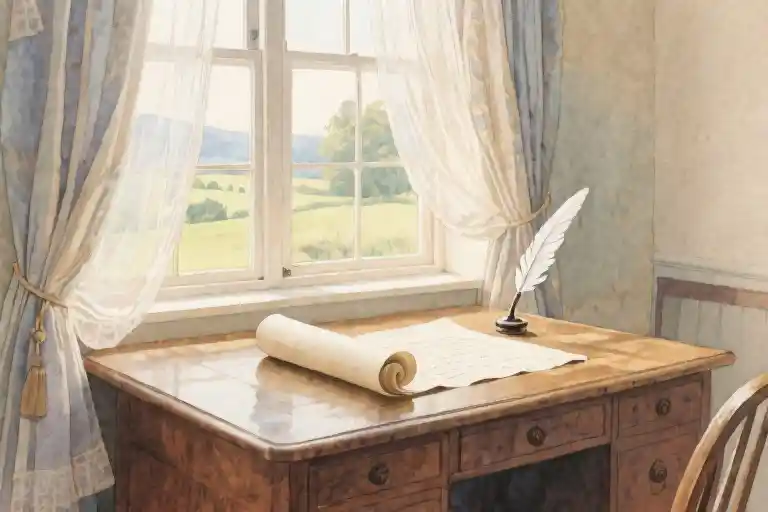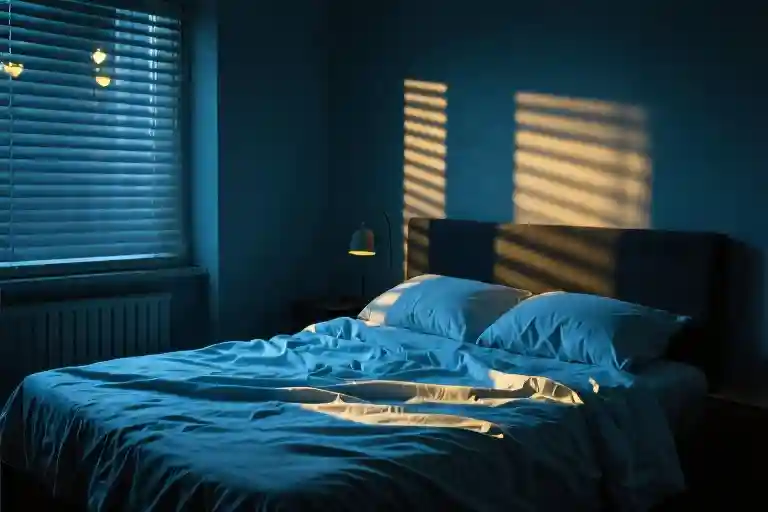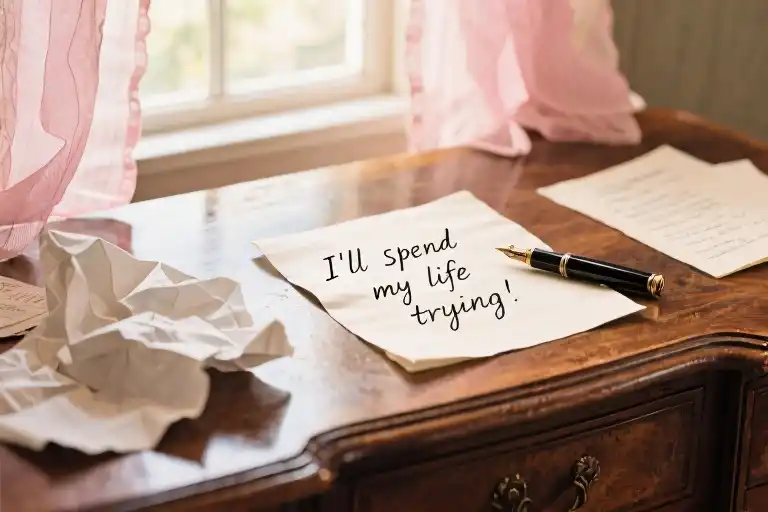There’s a peculiar kind of ache that comes with loving words too much. The sweet, tender ones that curl around your heart like morning mist—the ones that feel almost sacred in their honesty. Right now, my hands itch with them, these unspilled syllables pooling behind my ribs. But here’s the quiet tragedy: I have no address to send them to.
It almost feels ridiculous, doesn’t it? Drafting love letters to shadows, composing sonnets for a silhouette that hasn’t stepped into the light yet. The rational part of me whispers that this is just another romantic fantasy, the kind that gets polished into clichés. But then the deeper truth surfaces: what if this isn’t foolishness at all? What if these ink-stained daydreams are the most practical magic we have—the kind that keeps the windows of our hearts unlocked?
Hope wears strange disguises. Sometimes it’s the act of describing the crease that will one day appear between someone’s eyebrows when they’re puzzling over a map. Or documenting the exact shade of their laughter—not the performative kind, but the involuntary snort that escapes when joy overflows. These imaginings aren’t escapes from reality; they’re the blueprints we sketch while waiting for love to pour the foundation.
Maybe you know this feeling too—the weight of all these unwritten letters piling up inside you. The way you catch yourself cataloguing details about a stranger on the subway, wondering if their hands might someday be the ones you’re describing. There’s courage in this act of preparation, in keeping your heart’s mailbox empty but unlocked. After all, isn’t anticipation just love stretching itself toward the horizon?
So let these words sit here, this love letter to a possibility. Not as resignation, but as the quietest, most stubborn form of faith. Somewhere between these lines is the truth we rarely say aloud: that wanting itself can be its own kind of belonging.
The Love Letter to Your Face
I want to write about the way your expressions map the geography of your thoughts. That subtle crease between your eyebrows when you’re working through a problem – not quite a frown, but the visible ripple of a mind in motion. It’s the kind of detail most people would overlook, but to me it would become sacred topography.
Your laughter would leave its own cartography. Those shallow but unmistakable dimples that appear like punctuation marks at the corners of your smile, only surfacing when amusement overflows into genuine joy. I’d study their emergence like a scholar of happiness, noting which of my words or actions might coax them into visibility.
Then there’s your hair – not because it matters in any conventional sense, but because of how it carries the evidence of your daily life. The way strands might escape their arrangement when you’re distracted, or how sunlight would catch different tones in it depending on the hour. I’d want to document how it looks when you first wake up, that unselfconscious moment before the world demands presentation.
Your clothes wouldn’t be about fashion, but about how fabric becomes an extension of your presence. That sweater you wear when reading would hold the shape of your shoulders long after you’ve taken it off. The way your sleeves might roll up when you’re engaged in something practical, exposing forearms that tell stories through their movements rather than words.
All these fragments would matter not for their aesthetic value, but because they’d become my personal lexicon for understanding you. The vocabulary of your physical being would give me new ways to read emotions that words can’t always carry. In noticing these details, I wouldn’t just be observing – I’d be learning a language where every glance becomes translation practice.
What makes these imagined features precious isn’t their perfection, but their humanity. The slight asymmetry that makes your smile genuine rather than polished. The way your hair might resist complete order, just as your thoughts probably do. These would be the flaws that transform beauty into intimacy, the irregularities that make the imagined person feel reachably real.
This is why I want to write about your face before I’ve even seen it – because the act of imagining these details is already changing how I see. The discipline of observation sharpens my attention, trains me to appreciate the ordinary miracles of human expression. Even without you here, the practice of looking closely prepares me to truly see you when we meet.
The Sound of Your Presence
There’s something about the way you say my name – not the syllables themselves, but the particular way they form in your mouth, the slight hesitation before speaking as if weighing the importance of what comes next. I want to write about how your voice carries the warmth of morning sunlight, how it wraps around me like well-worn cotton when I’m unraveling at the edges.
Your voice isn’t just sound waves; it’s topography. The way it dips when you’re thoughtful, rises when amused, goes gravel-rough when tired. I imagine how it would feel to trace the contours of your speech patterns like following a familiar path through the woods. There’s comfort in anticipating each curve and bend.
Silence between us wouldn’t feel empty but full – the comfortable kind where two people can share space without filling it with unnecessary words. Your mere presence would calm the static in my brain, the way ocean waves reorganize chaotic sand into smooth patterns. Not by doing anything extraordinary, just by being.
I’d write about the particular quality of your listening – not the performative kind where people wait for their turn to speak, but the deep attention that makes others feel truly heard. How conversations with you would feel less like exchanges and more like discoveries, each sentence unfolding new layers neither of us knew were there.
There’s music in your ordinary speech – the cadence of asking about my day, the rhythm of recounting yours. Not poetic in an artificial way, but in the natural poetry of authentic human connection. I’d try to capture how your laughter functions as punctuation, how it breaks tension like sudden sunlight through clouds.
Most of all, I’d write about the quiet miracle of mutual recognition – how hearing “I understand” in your voice could heal wounds I didn’t know were still open. Not because you have all the answers, but because you’d have the rare courage to sit with questions rather than rushing to solutions.
This is what I mean when I say your voice brings calm. Not absence of noise, but presence of something deeper. The kind of peace that comes not from everything being perfect, but from being perfectly understood.
The Lightness You Bring
Laughter comes easily when I imagine you. Not the polite kind that fills awkward silences, but the uncontrollable sort that makes your shoulders shake and your eyes disappear into those shallow dimples. Your jokes aren’t particularly clever – they’re the silly, spontaneous observations that catch me off guard, the kind that would seem absurd if written down but become irresistible when delivered with your particular energy.
There’s a physics to your presence I can’t quite explain. The gravitational pull that makes everything feel lighter, as if problems shrink to manageable sizes when you’re near. My thoughts, usually so prone to spiraling, settle into calmer orbits around you. I want to write about how you turn grocery store runs into adventures and waiting rooms into comedy clubs, how you’ve mastered the alchemy of transforming ordinary moments into something brighter.
Alone, I sometimes measure time in coffees finished and emails sent. With you, I imagine we’d measure it in inside jokes created and shared glances exchanged across crowded rooms. Your particular magic lies in making the mundane feel like a gift – a trait I suspect you don’t even recognize in yourself. Where others see traffic jams, you’d see impromptu karaoke sessions; where most notice rain, you’d point out the perfect puddle for jumping.
This is what I long to capture in words: not just your humor, but the way it reshapes reality around us. The way your laughter becomes a language of its own, one that translates my quiet overthinking into present-moment joy. I want to describe the precise shade of your energy – not the exhausting brightness of perpetual cheer, but the warm, steady glow that makes others feel safe enough to be silly.
Sometimes I worry this imagined version of you couldn’t possibly exist. Then I remember – the best people usually don’t know how extraordinary they are. They simply move through the world leaving lightness in their wake, unaware they’re anyone’s antidote to loneliness. Maybe that’s you. Maybe you’re out there right now, cracking terrible puns to strangers, turning someone else’s ordinary day into something luminous, completely unaware that I’m writing this to you.
What a thing it would be, to have my solitude interrupted by your particular brand of joy.
The Language of Touch
There’s a particular kind of loneliness that lives in the space between your fingers when they have nothing to hold. I want to write about how your hands might feel – not in some grandiose romantic gesture, but in the ordinary moments where skin accidentally brushes against skin while passing a coffee cup. The electricity in those mundane collisions.
I imagine the warmth of your forearm when we sit side by side on a couch that’s slightly too small for two people. How the heat transfers through fabric, making me hyperaware of the three centimeters of wool separating us. The way I’d pretend not to notice while noticing everything.
Your skin would have its own vocabulary. The callus on your middle finger from holding pens too tightly. The surprising softness behind your left ear. The way your palm goes slightly damp when you’re nervous about something you won’t admit to being nervous about. These would become my braille, reading stories you never speak aloud.
Distance takes on new meaning when you’re imagining someone who doesn’t exist yet. I want to write about the precise millimeter where personal space becomes intimacy – that invisible border we cross when someone stops being ‘other’ and starts being ‘home’. How your shoulder against mine at a movie theater might feel like the most revolutionary act of my week.
The paradox of touch is that it requires presence, and you’re still an absence. Yet my skin keeps anticipating, like a shoreline waiting for waves. There’s something hopeful in that tension – the body’s stubborn belief that what it longs for must exist somewhere. Every nerve ending insists you’re out there, already real, just not yet mine.
Sometimes I press my own hand against my cheek to remember what tenderness feels like. It never quite works. The warmth is wrong, the pressure unconvincing. Like trying to tickle yourself. This is why we need each other – to be mirrors that reflect back sensations we can’t give ourselves.
I want to write about the way you might rest your forehead against mine when we’re both too tired for words. How breathing the same air could feel like sharing a secret. The quiet miracle of two separate circulatory systems choosing proximity. All this imagined touch lives in my bones like an ache, like a promise, like a question waiting for its answer.
The Mirror You Hold Up to My Soul
Writing about you makes me realize something unexpected – I’m not just describing an imaginary lover, but sketching the contours of my own becoming. The way you’d make me love myself isn’t some magical transformation, but rather the quiet realization that I’ve contained these capacities all along. Your hypothetical presence would simply hold up the mirror.
There’s a peculiar alchemy in how we discover ourselves through longing for others. The qualities I admire in you – that effortless confidence, the way you wear joy like a favorite sweater, your stubborn tenderness in a cynical world – these aren’t foreign traits I lack, but dormant ones I’ve been too hesitant to claim. When I write “you make me brave,” what I’m really confessing is how desperately I want permission to be brave on my own.
Perhaps this is why unspoken love letters hold such power. They function as secret blueprints for our best selves. The “color you’d bring into my life” turns out to be pigments I already possess, just waiting for the courage to mix them boldly. Your imagined laughter in my ears echoes my own stifled mirth, the jokes I swallow because they seem too silly, the delight I temper for fear of appearing naive.
And that’s the revolution no one warns you about – meeting your ideal partner would be less about finding someone new, and more about finally recognizing the person you’ve been all along. The worship I’d lavish on your ordinary miracles (your morning breath, your bad dancing, your terrible puns) reveals how harshly I judge my own human imperfections. Writing these words to you, I’m startled by the realization: what if I cherished myself the way I’d cherish you?
The empty page where your name should be has become my most honest confessional. These letters to a ghost lover are really love notes to my unlived potential. Every sentence about your warmth is really about the hearth I’m learning to build within myself. When I describe how you’d look at me, I’m practicing looking at myself with that same generous gaze.
So no, it’s not silly to write to someone who doesn’t exist yet. These words are the breadcrumbs I’m leaving for my future self to follow home. The love I can imagine receiving is the love I’m slowly learning to give – starting with these ink-stained fingers, this hesitant heart, this stubborn hope that keeps writing into the quiet.
The Space Between Loneliness and Hope
There’s a particular ache that comes with having so much to say and no one to say it to. It sits in your chest like a second heartbeat, persistent and impossible to ignore. These words of mine – tender, urgent, overflowing – press against my ribs with nowhere to go. I catch myself composing sentences in the shower, rehearsing phrases during my commute, building entire conversations with someone who isn’t there.
Perhaps you know this feeling too. That moment when you turn to share something trivial – the way the afternoon light slants through your kitchen window, or how a particular song made you think differently about Tuesday mornings – only to remember there’s no one waiting to hear it. The loneliness isn’t in being alone; it’s in the abundance of love with no destination.
Yet here’s the quiet rebellion in this emptiness: the very act of writing these unmailed letters becomes an act of faith. Each unsent word is a bet placed on possibility, a refusal to believe this is all there is. When I describe the way your laughter might sound or how your hands would feel tracing patterns on my back, I’m not just fantasizing – I’m practicing. Preparing my heart to recognize you when you finally appear.
This waiting isn’t passive. There’s courage in continuing to love before being loved in return, in keeping your heart open when every instinct says to protect it. The French have a phrase for this – ‘l’appel du vide,’ the call of the void – but I prefer to think of it as l’appel de l’amour. The call of love that hasn’t arrived yet, but will.
So I’ll keep writing these letters to nowhere. Not as evidence of what’s missing, but as proof of what’s coming. The pages will fill with descriptions of your hypothetical freckles, your imagined kindness, your yet-to-be-heard voice saying my name. And one day, when I least expect it, I’ll look up from my notebook to find you standing there – not identical to my imaginings, but better, because you’ll be real.
Until then, this space between loneliness and hope isn’t empty at all. It’s crowded with maybes and almosts and not-yets, all humming with potential. The love I can’t give you yet pools around my feet, but soon – oh so soon – there will be hands to catch it.
For now, the words wait with me. Full. Ready. Patient.
Yet.
Full of Words, Nowhere to Go
The page stays blank longer than it should. My fingers hover over the keyboard, tracing invisible letters in the air. There’s a peculiar ache in wanting to write a love letter with no address to send it to. All these words—sweet, tender, electric words—piling up inside with nowhere to land.
Maybe you know this feeling too. That restless energy when your heart swells with affection but finds no recipient. When you catch yourself imagining how someone’s laugh might sound before you’ve even heard it. When you mentally compose sentences about the way their hair might catch the afternoon light, though you’ve never seen them stand in it.
This isn’t about romanticizing loneliness. It’s about the quiet courage it takes to love something that doesn’t yet exist. To whisper into the dark, ‘I’m here. I’m ready.’
So let these words sit here between us, this unposted love letter to possibility itself. For anyone who’s ever:
- Saved playlist songs for ‘someday’
- Noticed perfect coffee shops for future shared mornings
- Practiced conversations with bathroom mirror reflections
- Felt phantom fingers interlacing with yours on empty subway rides
That ‘yet’ at the end isn’t just punctuation—it’s the hinge between longing and arrival. The space where hope lives. Your person may not know these words are for them, but somewhere, in some tomorrow, they’ll recognize themselves in the creases of your well-worn imaginings.
Until then, keep writing those unmailed letters. Date them and tuck them away like seeds. The strange magic of love is this: sometimes we have to name what we desire before it can find us.




